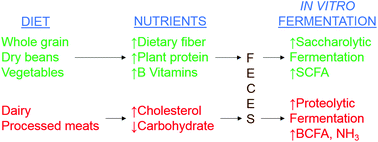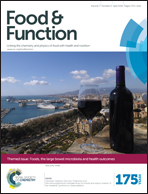The impact of long-term dietary pattern of fecal donor on in vitro fecal fermentation properties of inulin†
Abstract
Although the composition of the gut microbiota is of interest, the functionality, or metabolic activity, of the gut microbiota is of equal importance: the gut microbiota can produce either harmful metabolites associated with human disease or beneficial metabolites that protect against disease. The purposes of this study were to determine the associations between dietary intake variables and fecal short and branched chain fatty acid (S/BCFA) concentrations; to determine the associations between dietary intake variables and inulin degradation, short and branched chain fatty acid (S/BCFA) production, and ammonia production during in vitro fecal fermentation of a highly fermentable substrate (inulin); and finally to compare results from the fermentation of inulin with those obtained in a previous report using a poorly fermentable substrate (whole wheat; Yang and Rose, Nutr. Res., 2014, 34, 749–759). Stool samples from eighteen individuals that had completed one-year dietary records were used in an in vitro fecal fermentation system with long-chain inulin as substrate. Few dietary intake variables were correlated with fecal S/BCFA concentrations; however, intakes of several plant-based foods, especially whole grain, dry beans, and certain vegetables that provided dietary fiber, plant protein, and B vitamins, were associated with acetate, propionate, butyrate, and total SCFA production during inulin fermentation. In contrast, intake of dairy and processed meats that provided cholesterol and little fiber, were associated with ammonia and BCFA production. Comparing results between inulin and whole wheat fermentations, significant correlations were only found for butyrate and BCFA, suggesting that regardless of the type of carbohydrate provided to the microbiota, long-term diet may have a pronounced effect on the propensity of the gut microbiota toward either beneficial metabolism (butyrate production) or detrimental metabolism (BCFA production). These results may help in the development of new dietary strategies to improve gut microbiota functionality to promote human health.

- This article is part of the themed collection: Foods, the large bowel microbiota and health outcomes

 Please wait while we load your content...
Please wait while we load your content...